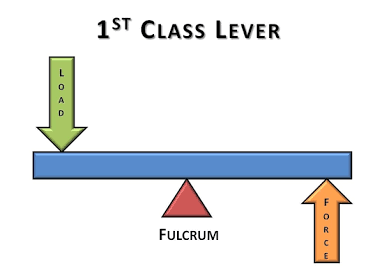Define open and closed skills
Open Skill: A skill performed in a variable or unpredictable environment influenced by external factors.
Closed Skill: Any skill performed in a closed and predictable environment.
What are the phases of motor learning
Cognitive, associative, autonomous
Draw a first class lever

Whats the difference between internal and external feedback
Intrinsic Feedback: Feedback athletes receive internally as a natural consequence of their performance.
Extrinsic Feedback: Feedback athletes receive from outside the performer.
What are all the motor skill continuums
Open and Closed
Gross and Fine
Discrete, Serial and Continous
What phase of motor learning would Lebron James be in
Autonomous
Draw a second class lever

What are the purposes of feedback
To reinforce good habits and eliminate bad habits
To motivate the performer
Define an discrete, serial and continous skill
Discrete skill: Have a clear start and a clear end-point
Serial Skill: A series of smaller combined to make a skill
Continuous Skills: Are repetitive and ongoing for a particular period of time.
What drills should an associative athlete use
Increase in speed, accuracy and inclusion of defenders in drills
Draw a third class lever

What are the stages of the information processing model
Input, Response-idetification/decision making, output, feedback
Define Gross and Fine motor skills
Gross Motor Skills: Skills that require the use of larger muscle groups
Fine Motor Skill: Skill that requires the use of small muscle groups
What kind of feedback would a Autonomous athlete mainly use
Internal feedback
What form of lever is a pushup
Second class lever
Whats the difference between knowledge of results and knowledge of performance
Knowledge of results (Objective): What actually happened
Knowledge of Performance (Subjective): What did we witness in terms of the skills technique.
Give a sporting example for each skill
Open Skill: Volleyball dig
Closed: Darts
Gross: High Jump
Fine: Golf putt
Discrete: Catching a ball
Serial:Layup
Continuous: Running
Provide a characteristic relating to each of the phases
Cognitive: Stage includes a lot of mistakes, External feedback is beneficial, Athlete develops a mental picture of the skill
Associative: Internal Feedback starts to develop, Consists of less errors, Lots of practice
Autonomous: Skill Comes Automatically, Ability in Redirecting Focus, Internal Feedback
What form of lever is a calf raise
Second class lever
Whats the difference between terminal and continous feedback
Terminal Feedback: Occurs at the end of the movement.
Continuous Feedback/ Concurrent: Feedback given while a performance is occurring